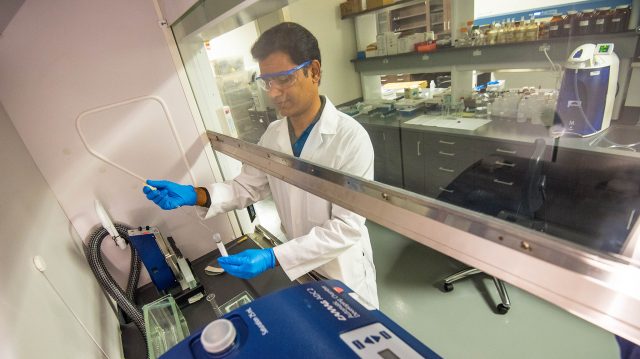
Researchers from the UM National Center for Natural Products Research and the UM Medical Center are using a grant from the National Institutes of Health to establish the Botanical Dietary Supplements Research Center. Photo by Kevin Bain/Ole Miss Digital Imaging Services
OXFORD, Miss. – The National Center for Natural Products Research, in partnership with the University of Mississippi Medical Center, has been awarded a nearly-$6 million grant from the National Institutes of Health to study the use of a popular oral supplement in promoting resilience against viral infections.
Through the award, the NCNPR, which is part of the University of Mississippi School of Pharmacy, established the Botanical Dietary Supplements Research Center and became a component of the NIH Consortium for Advancing Research on Botanicals and Other Natural Products, or CARBON, Program. Ikhlas Khan, NCNPR director, serves as the botanical center’s director and Nirmal Pugh is associate director.
“I’m thankful for the efforts of a great team who worked very hard to obtain this grant,” Khan said. “It speaks highly of our strength in the area of dietary supplements and will be a great opportunity to continue our efforts to assess the safety, quality and clinical relevance of these products for public health.”
Scientists will focus on the botanical Arthrospira platensis, commonly known as spirulina, to generate data needed to optimally design future clinical trials. The trials will evaluate spirulina’s effectiveness against and/or recovery from respiratory illnesses such as influenza.
Results will show whether the use of this botanical could provide an important complementary approach to current antiviral therapies that is inexpensive, safe and readily available to the public.
The new botanical center grant is the brainchild of Pugh, principal scientist in the NCNPR, who for the past 20 years has investigated the immune-enhancing properties of spirulina. Together with other researchers, the team patented a spirulina extract called Immulina that the university has licensed to ChromaDex.
Based on existing collaborations, a multidisciplinary grant team was assembled with the unified focus to investigate the mechanism and crucial factors by which Immulina may provide antiviral resilience through its impact on immune function.
Along with combining the expertise of the researchers in Oxford and Jackson, partnering with UMMC also will allow the natural products center and school to enhance research collaboration between the two campuses.
“Our group is delighted and honored to be a part of this center,” said Dr. Gailen Marshall, the R. Faser Triplett Sr. M.D. Chair of Allergy and Immunology at UMMC. “This support will provide opportunities for our research team to study the impact of this dietary supplement on the immune system.
“By establishing the supplement’s optimal form, determining how much it takes to protect against viral infections and studying its impact on antibody production, we hope to provide information that helps people minimize their risk for developing colds and influenza. We will also try to establish whether this supplement is useful in individuals whose immune systems are no longer at peak efficiency.”
The Office of Dietary Supplements established the CARBON Program in 1999 as part of a partnership with the National Center for Complementary and Integrative Health. The NCNPR botanical center is one of three awarded nationwide for the next five years.
“This is an exciting opportunity to advance the study of complex natural products and to build transdisciplinary research capacity within the new centers and among the greater natural products research community,” said Joseph M. Betz, acting director of ODS.
“These research centers demonstrate NIH’s firm commitment to rigorous investigation of natural products as they pertain to complementary and integrative health approaches,” said NCCIH Director Dr. Helene Langevin. “Exploring basic biological mechanisms of natural products is a strategic priority for us.”


